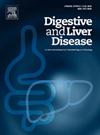ERCP时机对急性胆管炎ERCP长期疗效的影响--一项单中心回顾性研究。
IF 3.8
3区 医学
Q1 GASTROENTEROLOGY & HEPATOLOGY
引用次数: 0
摘要
导言急性胆管炎是一种危急的内科急症。ERCP的时机与急性胆管炎的临床预后之间的关系仍存在争议。本研究旨在评估 48 小时内进行 ERCP(急诊)是否与改善长期临床预后有关:本研究是对前瞻性数据库进行的单中心回顾性分析。纳入了海德拉巴 AIG 医院在 2022 年 1 月至 2022 年 12 月期间根据东京指南收治的所有急性胆管炎患者。我们评估了紧急ERCP与住院时间、再次介入治疗和再入院需求以及死亡率之间的关系:共有 301 名急性胆管炎患者接受了 ERCP 治疗,其中 217 名患者(31.3% 为女性;平均年龄为 54.02 ± 14.9 岁)接受了急诊 ERCP 治疗。其余 84 名患者(32.1% 为女性;平均年龄为 56.56 ± 13.9 岁)接受了常规 ERCP 检查。58 名(26.7%)和 22 名(26.2%)III 级患者分别接受了急诊和常规 ERCP。紧急ERCP的住院时间中位数(IQR)为8.00(6.00 - 11.00)天,常规ERCP的住院时间中位数(IQR)为11.00(8.00 - 15.00;P值为0.0001),ERCP术后住院时间相似(P值为0.26)。接受紧急ERCP(22.1%;48/217)或常规ERCP(31.0%;26/84,P 0.135)的患者一年内的死亡率无明显差异。cox 比例危险模型显示,死亡率与年龄(HR 1.034;95 %CI:1.013 - 1.054;P 0.001)和恶性肿瘤(HR 8.64;95 %CI:4.728 - 15.790;P 0.0001)独立相关。结论:急性胆囊炎急诊ERCP与急性胆管炎急诊ERCP相比,在再介入治疗和再入院方面没有明显差异:结论:急性胆管炎急诊ERCP与总死亡率、再干预需求和再入院率相关,但总住院时间较短。目前还需要通过随机对照研究来证实这些发现。本文章由计算机程序翻译,如有差异,请以英文原文为准。
Impact of timing of ERCP on long term outcomes of ERCP for acute cholangitis – A single center retrospective study
Introduction
Acute cholangitis is a critical medical emergency. The association between the timing of ERCP and clinical outcomes of acute cholangitis is still debated. The current study aims to evaluate whether ERCP within 48 h (urgent) is associated with improved long term clinical outcomes.
Methods
This study is a single-center retrospective analysis of a prospectively maintained database. All patients admitted with acute cholangitis as per Tokyo guidelines at AIG Hospitals, Hyderabad between January 2022 to December 2022 were included. We evaluated the association between urgent ERCP and length of hospital stay, need for reintervention and readmissions, and mortality.
Results
A total of consecutive 301 patients underwent ERCP for acute cholangitis; of which 217 patients (31.3 % females; mean age 54.02 ± 14.9 years) underwent urgent ERCP. The remaining 84 (32.1 % females; mean age 56.56 ± 13.9 years) underwent routine ERCP. Fifty-eight (26.7 %) and 22 (26.2 %) patients with Grade III underwent urgent and routine ERCP respectively. The median (IQR) hospital stay for urgent ERCP was 8.00 (6.00 – 11.00) days and for routine ERCP was 11.00(8.00 – 15.00; p value 0.0001), with similar hospital stay post ERCP (p 0.26). There was no significant difference in mortality upto one year between patients who underwent urgent (22.1 %;48/217) or routine ERCP (31.0 %;26/84, p 0.135). The cox proportional hazard model showed that mortality is independently associated with older age (HR 1.034;95 %CI: 1.013 – 1.054; p 0.001) and malignancy (HR 8.64;95 %CI:4.728 – 15.790; p 0.0001). There was no significant difference between two groups in terms of need for reinterventions and readmissions.
Conclusions
Urgent ERCP for acute cholangitis is associated comparable overall mortality, need for reinterventions, and readmissions with decreased total length of hospital stay. There is an unmet need to confirm these findings by randomized controlled studies.
求助全文
通过发布文献求助,成功后即可免费获取论文全文。
去求助
来源期刊

Digestive and Liver Disease
医学-胃肠肝病学
CiteScore
6.10
自引率
2.20%
发文量
632
审稿时长
19 days
期刊介绍:
Digestive and Liver Disease is an international journal of Gastroenterology and Hepatology. It is the official journal of Italian Association for the Study of the Liver (AISF); Italian Association for the Study of the Pancreas (AISP); Italian Association for Digestive Endoscopy (SIED); Italian Association for Hospital Gastroenterologists and Digestive Endoscopists (AIGO); Italian Society of Gastroenterology (SIGE); Italian Society of Pediatric Gastroenterology and Hepatology (SIGENP) and Italian Group for the Study of Inflammatory Bowel Disease (IG-IBD).
Digestive and Liver Disease publishes papers on basic and clinical research in the field of gastroenterology and hepatology.
Contributions consist of:
Original Papers
Correspondence to the Editor
Editorials, Reviews and Special Articles
Progress Reports
Image of the Month
Congress Proceedings
Symposia and Mini-symposia.
 求助内容:
求助内容: 应助结果提醒方式:
应助结果提醒方式:


